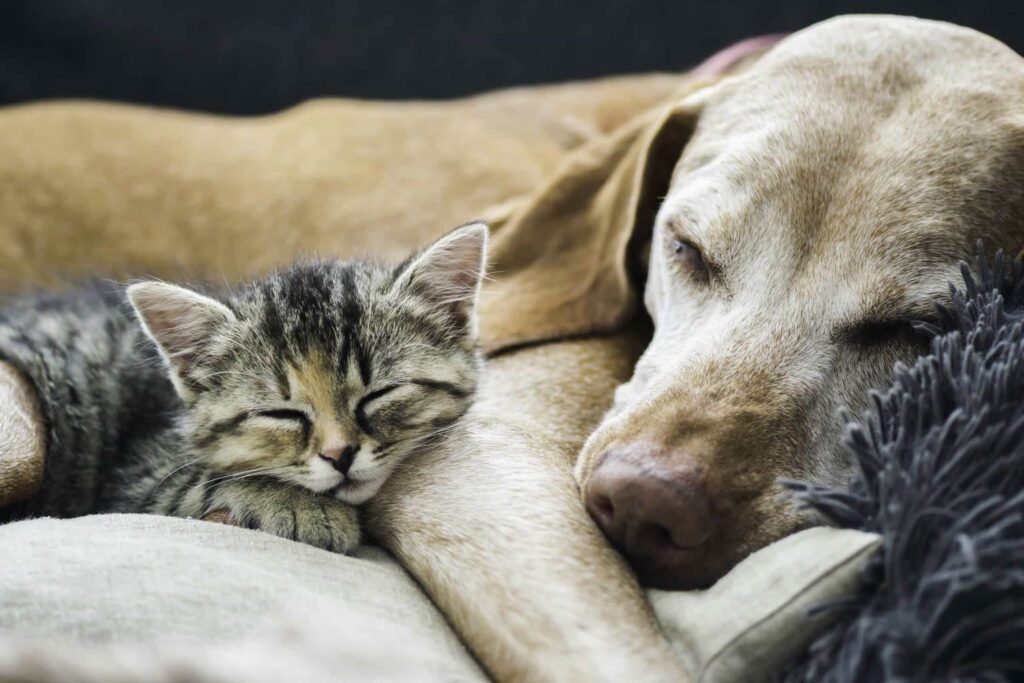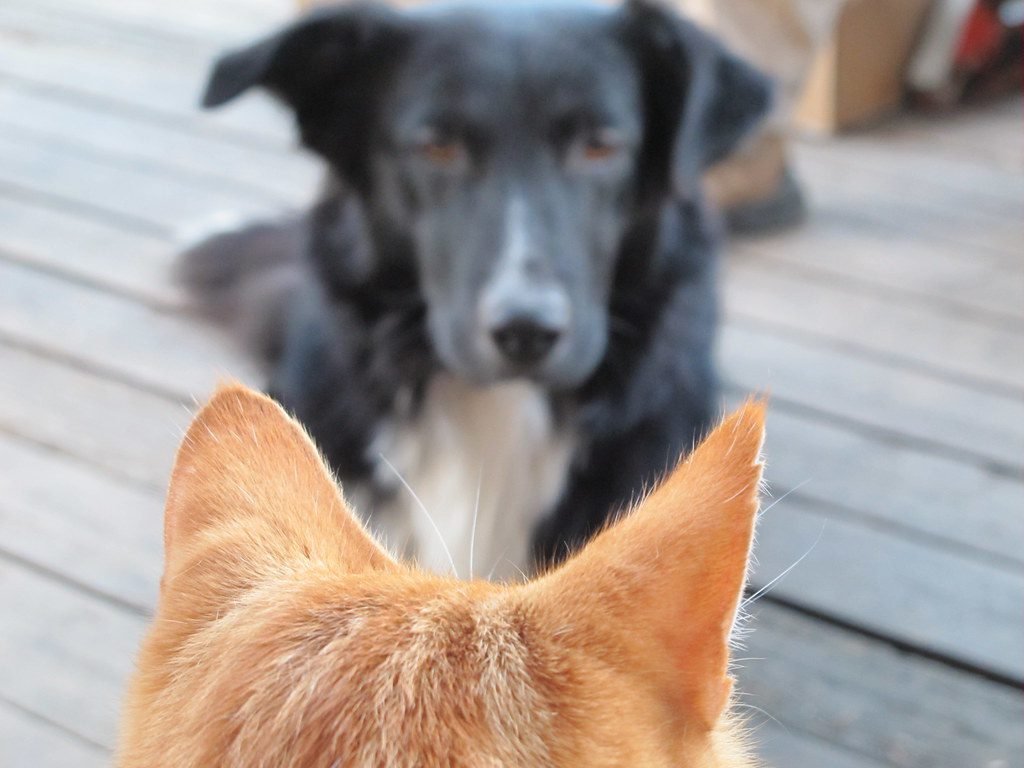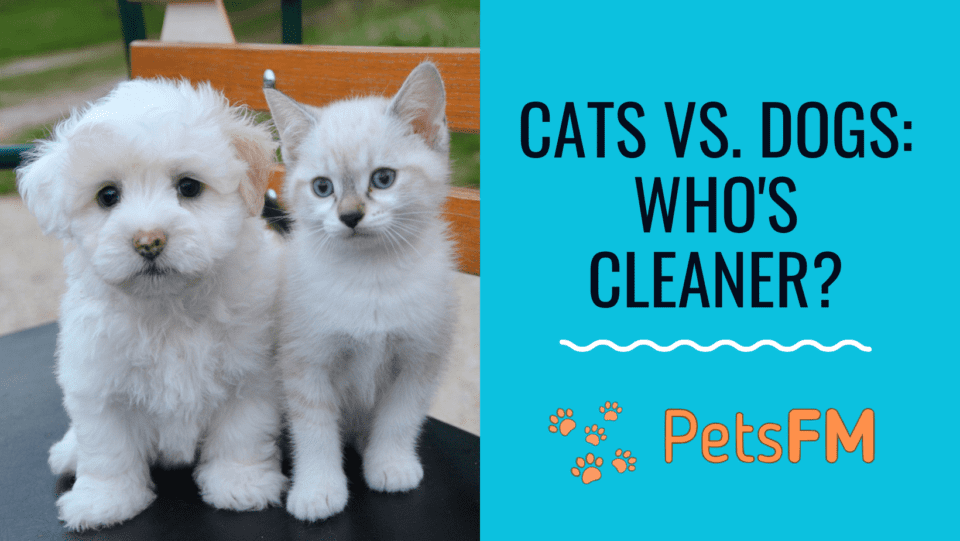


10+ cute reasons why your cat sleeps at your feet
February 22, 2024


Can Rabbits Eat Cabbage? Is It Safe to Eat?
February 23, 2024Pets are a big part of our lives. Some people think cats are cleaner than dogs, while others don’t see much difference. It’s essential for those looking to get a pet to know about their cleaning habits. This helps them decide which pet is right for them.
This blog will look at how clean cats and dogs are. We’ll see how they keep themselves clean and what that means for your home. Our goal is to compare cats and dogs. This way, you can choose the best pet for you, knowing all about their cleanliness. But first, here’s a quick answer:
Generally, cats are considered cleaner than dogs. Cats constantly groom themselves, reducing their odor and keeping their fur clean without needing frequent baths. They also use a litter box for their needs, which is easier to manage indoors. Dogs, however, often require help from their owners for grooming and cleanliness, including regular baths and outdoor bathroom breaks. Yet, cleanliness varies by individual pet habits and the care they receive from their owners.
Cleanliness in pets
Cleanliness in pets means how they keep themselves tidy. This includes how they groom, if they drool, and their fur shedding. Pets clean themselves in different ways.
Cats are known to clean themselves a lot. They use their tongues to lick their fur and keep it neat. Cats do not drool much and usually shed less than dogs. They also use a litter box for their bathroom needs, which keeps their area clean.
Dogs have their ways of staying clean but need more help from us. They might need baths from their owners because they play outside and can get dirty. Dogs can drool more than cats, especially certain breeds. They also shed fur, which can mean more cleaning for their owners.
Both cats and dogs have their unique ways of staying clean. Knowing these habits is essential to keep our pets and homes tidy.


Cat Sleeping alongside a Dog
Also, Read: 18 Cat Breeds With Very Long Legs: Comprehensive Guide
The cleanliness of cats
Cats are known for their cleanliness, often seen grooming themselves and using litter boxes by instinct. Their habits contribute to a cleaner living environment, manage shedding effectively, and generally result in less odor than dogs.
Grooming Habits
Cats clean themselves every day. They use their tongues to lick their fur. This helps them remove dirt and loose hair. They do this several times a day to stay clean and tidy. Cats don’t usually need baths from us because they care for their cleanliness.
Litter Training
From a young age, cats naturally know how to use a litter box. They dig, go to the bathroom, and then cover it up. This keeps their area clean and reduces smells. It’s one of the reasons cats are good pets for indoor living.
Shedding and Allergies
Cats shed fur, but not all shed the same amount. Their self-grooming helps control shedding. This means less hair around the house. Some cat breeds even have less fur or shed very little. This can be better for people with allergies.
Odor Control
Cats generally don’t smell as much as dogs. Their regular grooming helps keep them smelling fresh. Also, because they use a litter box, keeping the house smelling nice is easier. Cats cover up their waste, which helps control odors even more.
The cleanliness of dogs
Dogs have different needs when it comes to staying clean. Their grooming, house training, and outdoor activities all affect their cleanliness. Shedding also varies by breed, affecting not just their cleanliness but also the cleanliness of their living spaces.
Grooming Needs
Dogs need help from their owners to stay clean. This includes baths, brushing, and sometimes professional grooming. Different breeds require different care. Some dogs need more brushing to avoid mats, while others might need regular haircuts.
House Training
Training dogs to go to the bathroom outside is essential for keeping the house clean. It can be challenging but is usually successful with patience and consistent training. Puppies might take longer to learn this.
Shedding and Allergies
All dogs shed, but how much depends on the breed. Some dogs shed a lot, and others hardly at all. Regular brushing helps keep shedding under control. For people with allergies, some breeds are better because they shed less.
Outdoor Activities
Dogs love to play outside. This can make them dirty and bring dirt into the house. Mud, leaves, and even bugs can appear on their fur and paws. Cleaning them off after outdoor fun helps keep the house clean.
Also, Read: Does my cat know I love her? Do they understand love language?


Playing with Dog – Exercise
Factors Influencing Pet Cleanliness
The cleanliness of pets can be affected by their breed, how their owners take care of them, and where they live. Some pets might naturally be neater, while others need more help staying clean.
Breed Specifics
Some types of cats and dogs are cleaner by nature. For example, certain cat breeds groom themselves more often. Some dog breeds don’t shed much fur. But other breeds might need more cleaning because they drool more or shed a lot of fur.
Human Intervention
Owners play a big part in keeping pets clean. This includes brushing their pet’s fur, bathing, and feeding them good food. Taking pets to the vet also helps keep them healthy and clean. Pets need their owners to help them stay tidy.
Environmental Factors
Where pets live affects how clean they are. Indoor pets usually stay cleaner than outdoor pets. Pets that spend a lot of time outside might get dirtier. They can bring in mud, leaves, or even bugs from outside. Keeping the living area clean for indoor pets helps a lot.
Pros and cons of owning a cat and dog
Owning pets comes with its set of joys and challenges, especially when it comes to cleanliness. Here’s a balanced look at the pros and cons of having cats and dogs, with anecdotes and findings to give you a clearer picture.
Cats
Pros:
- Self-Cleaning: Cats are meticulous groomers, often keeping themselves clean without much human intervention. Studies have shown that cats spend about 30-50% of their waking hours grooming.
- Litter Box Use: Cats naturally use a litter box, making it easier to manage their waste indoors. This habit helps keep the home environment cleaner.
Cons:
- Shedding: While cats groom themselves, they can still shed fur around the house, which requires regular cleaning.
- Allergies: Cat dander is a common allergen. Despite their cleanliness, their dander can cause allergic reactions in some people.
Dogs
Pros:
- Trainability: Dogs can be trained to go to the bathroom outside, which can keep the house clean. Many dog owners share success stories of house-training their pets efficiently.
- Variety of Breeds: Some dog breeds are known for being hypoallergenic and shed less, which can be a significant advantage for cleanliness and people with allergies.
Cons:
- Grooming and Baths: Dogs generally require more effort from their owners in terms of grooming and baths to stay clean, which can be time-consuming and costly.
- Outdoor Activities: Dogs love playing outside, which means they often bring dirt, mud, and other outdoor elements into the home, requiring more frequent cleaning efforts.


Cats vs Dogs
Editor’s Pick: Do Dog Whistles Hurt Dogs? Myth Busted
Making the right choice for yourself
Choosing between a cat and a dog depends on your lifestyle, how much time you can spend on pet care, and your cleanliness standards. Both can be clean companions with the proper care and attention.
- Consider Your Lifestyle: Cats are more independent and can be a good choice if you have a busy schedule. Dogs often need more attention and time for walks and play.
- Time Commitment: If you have less time for grooming and outdoor activities, a cat might suit you better. Dogs require regular walks and more frequent bathing.
- Cleanliness Standards: For those concerned about cleanliness, consider a pet’s shedding and grooming needs and whether you’re prepared to deal with a litter box or prefer outdoor bathroom breaks.
- Space: Think about your living space. Cats usually adapt well to indoor environments, while dogs might need more space and access to a yard for their energy and bathroom needs.
Conclusion
This blog explored how cats and dogs differ in cleanliness, from grooming habits to their impact on your home. Remember, cleanliness is just one aspect to consider when choosing a pet.
Anecdotes from pet owners often highlight these points. For instance, a cat owner may brag about their pet’s independence in cleanliness, while a dog owner might share a funny story about bath time or muddy paws adventures. Regardless, cats and dogs bring companionship and joy, with their cleanliness levels manageable with the proper care and understanding.
Whether you lean towards a cat’s independence or a dog’s companionship, consider your lifestyle and readiness to provide care and grooming. Choosing the right pet means committing to their well-being and cleanliness.



